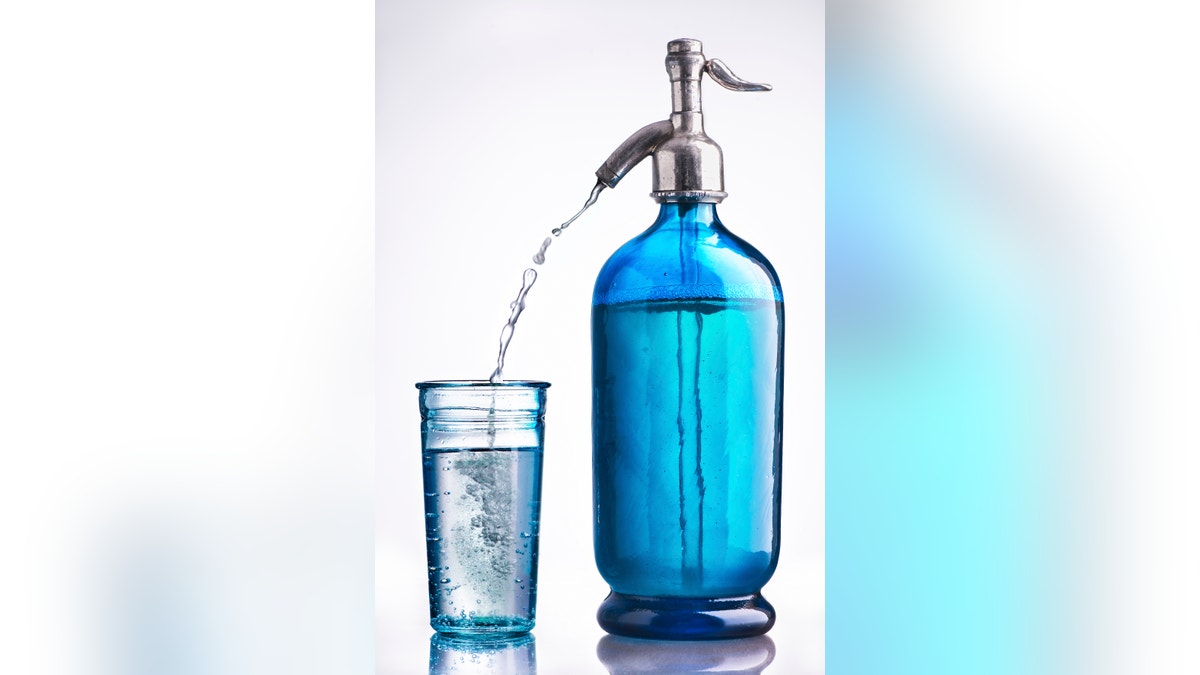
Vintage water siphon pouring water over a almost full glass
For anyone who loves fizzy water, picking out a bottle can be a little tricky. Seltzer, sparkling mineral water, club soda—there are so many types, how do you know what’s in what? And are they really as healthy as we think? To find out more about our beloved bubbly, we talked to Atlanta-based nutritionist Marisa Moore, RDN.
Is carbonated water as hydrating as flat water?
Yes it is, says Moore. A glass of carbonated water contributes to your daily fluid needs. And it’s a great alternative for anyone trying to kick a soda habit: You get the same pleasant fizz without the calories and health risks associated with both regular and diet soda (think weight gain, diabetes, high blood pressure, and heart disease).
RELATED: 10 Reasons to Give Up Diet Soda
Is it true that fizzy water can erode your bones?
Nope, the claim that carbonated water interferes with calcium absorption, thus upping a person’s risk of osteoporosis, is just a myth, according to Moore. (Phew!) “There’s no good evidence that carbonated water alone harms your bones,” she says.
It can, however, have an effect on your teeth. When water is carbonated, carbonic acid forms, lowering its pH. And consuming acidic drinks can cause your tooth enamel to erode, which may lead to sensitivity and cavities.
RELATED: 3 Ways to Protect Your Teeth If You Are Addicted to Seltzer
What’s up with seltzers that taste sweet?
Just because a beverage is clear, fizzy, and has zero calories, that doesn’t mean it’s carbonated water. There are some diet sodas that are marketed as seltzer even though they contain artificial sweeteners. The only way you can distinguish a fake from the real thing is by taking a peek at the ingredients. If you see that it contains any chemicals like aspartame, it’s not carbonated water.
RELATED: Best and Worst Foods for Your Teeth
How are the three types of fizzy water different?
Sparkling Mineral Water, sold by brands like San Pellegrino and Perrier, is bottled at the source, which means that it has naturally occurring minerals and carbonation (though San Pellegrino adds some extra fizz). The bubbles are fine and delicate, creating a slight effervescent texture. Mineral water is less acidic than other fizzy waters, but because it’s sourced naturally and often imported, it tends to be a little pricer.
Seltzer—which is also called sparkling water—is carbonated artificially, and has bigger, sharper bubbles. It contains no ingredients other than water. But some brands (like Polar, Canada Dry, and Schweppes) sell varieties that are flavored naturally with lemon and lime.
Club Soda is essentially the same as seltzer with a few additions. Ingredients like salt, potassium bicarbonate, and potassium sulfate give club soda its salty, mineral taste. But the distinction in taste is minimal, and many people don’t notice it. Look for club soda sold by brands like Schweppes and Canada Dry.








































